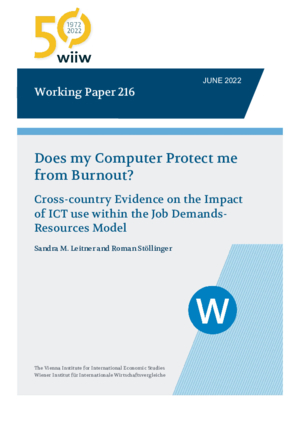Does my Computer Protect me from Burnout? Cross-country Evidence on the Impact of ICT use within the Job Demands-Resources Model
Sandra M. Leitner and Roman Stöllinger
wiiw Working Paper No. 216, June 2022
44 pages including 6 Tables and 4 Figures
This paper uses a large sample of employees from 35 European countries to study the direct and indirect effects of ICT use on burnout and work engagement as two opposite poles of employee psychological health, where the former comprises the three dimensions of exhaustion, cynicism and professional efficacy. It applies the Job Demands-Resources (JD-R) model and analyses the mediating role of three job demands (work extensity, work intensity, social demands) and four job resources (social support from management or colleagues, job control, rewards) on workers’ psychological health. It accounts for the importance of the place of work for the effect of ICT use on workers’ psychological health by differentiating between four types of workers: home-based workers, highly mobile workers, occasionally mobile workers, and workers who always work at the employer’s premises. The results show that ICT use is associated with lower levels of exhaustion but is unrelated to work engagement. Furthermore, work intensity, work extensity, social demands and rewards mediate the effect of ICT use on exhaustion, while job control and rewards mediate the effect of ICT use on work engagement. Our multi-group analysis attributes the negative effect of ICT use on exhaustion mainly to occasionally mobile workers and to workers who always work at the employer’s premises and highlights that the factors that mediate the effect of ICT use on workers’ psychological health differ across the four types of workers. Home-based workers stand out in two important respects: first, ICT use per se is unrelated to burnout; second, only one factor – work intensity – mediates the effect of ICT use on burnout, but its effect is especially strong.
Keywords: ICT use, burnout, work engagement, main place of work, job demands-resources model
JEL classification: I10, I31, J81
Countries covered: Albania, EU28, Montenegro, North Macedonia, Norway, Serbia, Switzerland, Turkey, Austria, Belgium, Bulgaria, Croatia, Cyprus, Czechia, Denmark, Estonia, Finland, France, Germany, Greece, Hungary, Ireland, Italy, Latvia, Lithuania, Luxembourg, Malta, Netherlands, Poland, Portugal, Romania, Slovakia, Slovenia, Spain, Sweden, United Kingdom
Research Areas: Labour, Migration and Income Distribution
